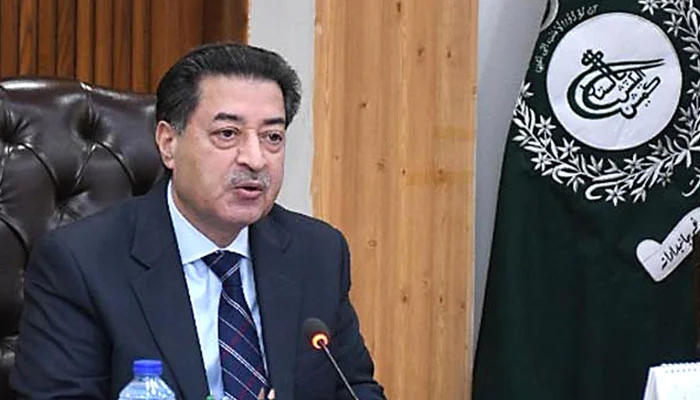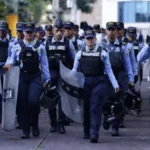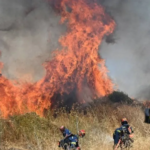LAHORE/ISLAMABAD: As the nation gets ready for the highly anticipated general elections, which are set to take place on February 8, Chief Election Commissioner Sikandar Sultan Raja gave an order to ensure the security of leaders and voters of all political parties during a meeting held at the Election Commission of Pakistan (ECP), The News reported on Thursday.
The chief of the electoral body also instructed relevant authorities and officials to strictly adhere to the election code of conduct during the meeting to review the law and order and security situation. The chief emphasized that it was the duty of the administration and law enforcement agencies to ensure timely administrative and security arrangements for the successful, safe, and peaceful conduct of polls.
Inspectors general of police (IGPs), chief commissioner Islamabad, and chief secretaries from each of the four provinces told the gathering that all the necessary preparations had been made for handling any eventuality as well as for conducting elections.
The CEC emphasized that safety and security were essential to offer political parties, candidates, and voters with a safe atmosphere in which they could exercise their right to vote.
The gathering was informed that although certain regions of the nation were under threat alert, every effort would be made to ensure peaceful elections, and that all sensitive voting places will have closed-circuit television (CCTV) cameras installed.
In order to help preserve a calm environment at the polling places, peace committees are also being established at the polling station level, according to the chief secretary (CS) of Balochistan. To prevent the elections from being postponed, the Punjab CS stated that explicit policy directives about modifications to the distribution of electoral symbols have to be released. The CEC responded by stating that ballots were still being printed. It will therefore be challenging to organize elections in such constituencies if changes are made to the election symbols at this time.
The meeting was briefed by the interior secretary that federal control rooms had been established to oversee the elections.
He said that the interior ministry was in contact with all organizations and that preparations were being made to support the ECP and ensure that elections were held peacefully.
Every IGP was guaranteed that in cases where there was a lack of police, other security agencies would be called in. The meeting made it clear that any poll worker or institution’s disregard for the orderly conduct of elections would not be allowed.
CEC Sikandar Sultan warned that harsh measures would be imposed against candidates and other violators of the law and code of conduct. “Elections will be closely watched, and polls will take place on time,” he continued. The meeting was informed that polling places damaged by flooding were undergoing repairs.
The chief secretary of Khyber Pakhtunkhwa (KP) told the gathering that on election day, public access to polling places in the regions affected by snowfall would be guaranteed, and all highways would remain open. The CEC thanked all of the participants and conveyed its pleasure with all of the plans and precautions put in place to ensure a smooth election process. He stated that the Election Commission would rigorously carry out its duty under Article (3)218 of the Constitution, which requires it to conduct peaceful and transparent elections.
Judge Ali Baqar Najafi’s three-person Lahore High Court (LHC) bench, in the meantime, dismissed the appeals of Imran Khan, Shah Mehmood Qureshi, Parvez Elahi, and other petitioners, declaring the reserved ruling on over sixty petitions.
Along with rejecting a petition by the PTI founder’s attorney, the bench maintained the rulings of the appeal tribunal and returning officer (RO) that had rejected the candidate’s nomination papers and review petitions for NA-89 Mianwali and NA-122 Lahore. Imran is now ineligible to run in the 2024 elections due to the verdict of the LHC.
Shah Mehmood had filed challenges against NA-150, NA-151, and PP-218 for rejecting his nomination. Chaudhry Parvez Elahi filed a review case, which the bench dismissed, alleging that his nomination papers were rejected from four constituencies: PP-32, PP-34, NA-64, and NA-69.
Likewise, the review petitions submitted by Khurram Latif Khosa, Hammad Azhar, and Sanam Javaid from NA-119 and NA-120 were similarly denied.
Additionally, Sanam Javaid had contested the denial of her PP-150 nomination documents. The appeal filed by Fawad Chaudhry against the rejection of the NA-60 and NA-61 nomination papers was also denied. Additionally, a petition challenging his wife Hiba Fawad’s nomination papers being denied was denied by the court.
Rehana Dar, the mother of Umar and Usman Dar, did, however, have her nomination papers accepted from PP-46 and NA-71. She would run against Khawaja Asif, the leader of the PMLN. In a separate development, the Lahore High Court received applications contesting the acceptance of the nomination papers submitted by former prime ministers Nawaz and Shehbaz Sharif. The petitioner argued that Nawaz and Shehbaz were the masterminds behind an attempt to overthrow Pakistan’s Supreme Court.
While the matter was still ongoing with the SC, an appeal panel approved their documents in violation of the law and in opposition to the facts. He asked the court to revoke the nomination papers’ approval and prevent the two from running for office.
Dr. Usman Anwar, Punjab’s Inspector General of Police (IGP), has stated that 19 of the province’s parliamentarians are under threat from security concerns. Speaking with the media during the ECP meeting in Islamabad, he explained that security reasons prevented him from revealing the politicians’ identities. He stated that there was a 92,000 shortfall of security guards at polling places in Punjab. This time, there would be more than 50,000 polling places.







